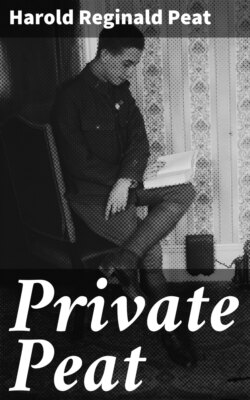Читать книгу Private Peat - Harold Reginald Peat - Страница 12
На сайте Литреса книга снята с продажи.
ARE WE DOWNHEARTED? NO!
ОглавлениеTable of Contents
"Hush, boys, … we're in enemy country!" our second in command whispered ominously. We shivered. The sound of the guns seemed to grow louder. Captain Johnson repeated his warning:
"Not a word, men," he muttered, and we stumbled out of the station in silence that could be cut with a knife. Sure enough the enemy was near. He couldn't have been less than twenty-two miles away! We could hear him. There was no disposition on our part to talk aloud. Captain Johnson said: "Whisper," and whisper we did.
We trekked over mud-holes and ditches, across fields and down through valleys. We had many impressions—and the main impression was mud. The main impression of all active service is—mud. It was silent mud, too, but we knew it was there. Once in a while during that dark treading through an unfamiliar country one of the boys would stumble and fall face down. Then the mud spoke … and it did not whisper. There were grunts and murmurings, there were gurgling expletives and splutterings which sent the army, and all fools who joined it, to places of unmentionable climatic conditions. We were in it up to our necks, more or less literally.
All the way along we could see the flashes of star shells. When one went up we could fancy the battalion making a "duck" in perfect unison. The star shells seemed very close. It was still for us to learn that they always seem close.
After about seven miles of this trekking, we reached billets. This was our first experience of French billets. The rest-house was a barn and we were pretty lucky. We had straw to lie on.
Notwithstanding our distance from the enemy, as Captain Johnson had said, we were in his country, and in consequence there had to be a guard. Four of the boys were picked for the job. There was no change in my luck. I was one of the chosen four.
The guardroom, whether for good or ill, was set in a chicken house. And thereby hangs a tale—feather. Corporal of the guard was a sport. He was a young chap from Red Deer, Alberta. Now, figure the situation for yourself. For days past we had been feeding on bully beef—bully beef out of a tin. Four men on guard, a dozen chickens perched not a dozen feet away. Would abstemiousness be human? Ask yourselves, mes amies.
We drew lots. My luck had turned. But I ate of it. It was tender; it was good; it was roasted to a turn.
They say dead men tell no tales. Of dead chicken there is no such proverb. Wish there had been. We buried those feathers deep. Alas, that Monsieur, in common with all the folk in Northern France, was so thorough in his cataloguing of his properties. I don't blame him. He had dealt with Germans when they overran the territory. He had met with Belgians when they hastened forward. He had had experience of his own countrymen when they endeavored to drive back the enemy. He had billeted the Imperial British soldier. Now he was confronted with a soldier of whom he had no report, save only the name—Canadian. Monsieur had counted his chickens before they were perched.
We had not yet had read or explained to us the laws and penalties attaching to such a crime while on active service. Of course, no one killed that chicken. No one ate it. No one knew anything about it. We were perfectly willing, if need be, to pay double price for the chicken rather than have such a term as "chicken thief" leveled at us. We of the guard, however, protested, but paid five francs each to smooth the matter over. This totaled about four dollars.
The next morning the whole battalion was lined up before the colonel while the adjutant read aloud the law which we boys term the "riot act." This document informed us very clearly that if any soldier was found to have taken anything from the peasantry for his own use; if any man was found drunk on active service, or if he committed any other crime or offense which might be counted as minor to these two, the punishment for a first offense would be six months first field punishment. For any offense of a similar nature thereafter the man would be liable to court martial and death.
While this paper was being read, I shook in my boots, to think that I had been—innocently or at least ignorantly—associated with what was probably the first crime of our battalion.
